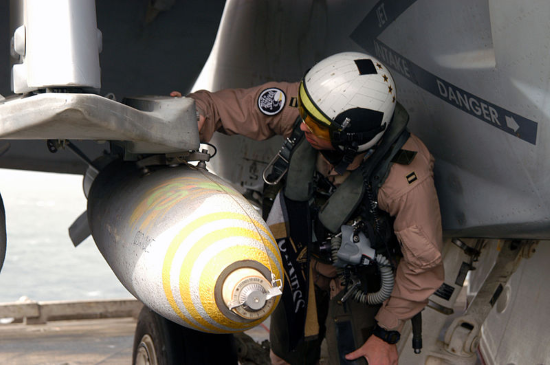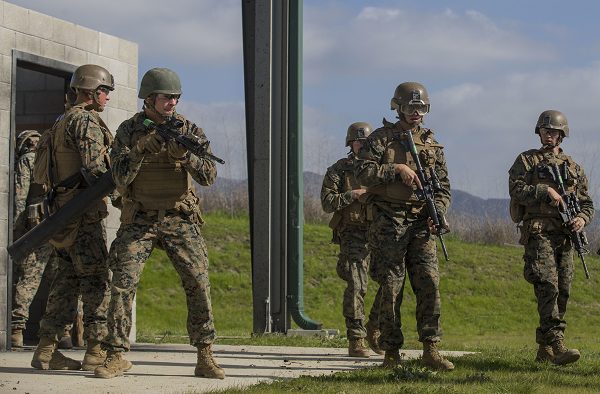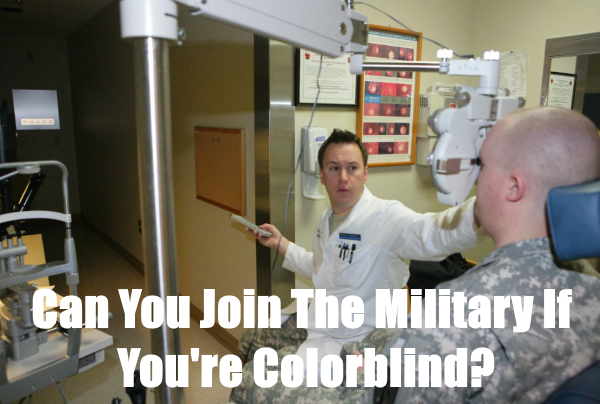Many people assume that being colorblind can disqualify you from joining the military.
So, can you join the military if you’re colorblind?
Colorblindness does not affect a person’s overall eligibility to join the U.S. military.
Those with this condition may be ineligible for specific military occupational specialties (MOS).
However, it is not an automatic disqualifier for joining the armed forces.
Related Article – Vision Requirements For Each Military Branch
Table of Contents
What Is Colorblindness?
If a person is colorblind, it means that they see colors differently than non-colorblind people.
Colorblindness can make it difficult to tell the difference between certain colors.
The most common type of colorblindness is determining the difference between red and green.
Some people who are colorblind have difficulty telling blue from yellow.
Also, it is possible to be completely colorblind and not see colors at all.
However, this is uncommon.
The primary symptoms of colorblindness are difficulties in:
- Seeing the difference between colors
- Noticing the brightness of colors
- Discerning shades of colors
Usually, these symptoms are mild, and the colorblind person may not even realize the difference in their experience.
Here are some elevated risk factors for colorblindness:
- Males are at higher risk (about 1 in 12)
- Family history of colorblindness
- Some eye diseases (glaucoma, macular degeneration)
- Some health problems (diabetes, Alzheimer’s, multiple sclerosis)
- Damage to eyes or brain
There is no cure for colorblindness, and the onset for most is at birth.
Special glasses or contact lenses can help.
However, most colorblind people adjust to the condition without serious or adverse effects.
Prospective recruits may be unsure whether they have any colorblindness.
Therefore, color vision testing is done upon arrival at a Military Entrance Processing Station (MEPS).
Army Colorblind Policy

Not every job in the U.S. Army is available for colorblind soldiers.
However, there are many options for soldiers with this condition to have rewarding careers.
During Army MEPS, potential enlistees may undergo two tests for red/green color vision.
The PIP (Pseudo Isochromatic Plate) color test is administered first.
This test is made up of circles with similar colors that form a number in the middle.
If someone cannot determine the number in the PIP test, they are given the FALANT (Farnsworth Lantern Test).
The FALANT tests a person’s ability to differentiate between red and green lights.
Click Here to take a sample FALANT test and see how you do.
If a potential soldier fails both the PIP and FALANT, Army applicants are then given the Army Red/Green test.
If the applicant passes one color vision test, MEPs will not conduct the other tests.
Even if you fail all three, there is opportunity to still serve and qualify for many jobs in the U.S. Army.
Here are some of the jobs available to soldiers with partial or full colorblindness:
- Human Resource Specialist (42A)
- Automated Logistical Specialist (92A)
- Cyber Operations Specialist (17C)
- Paralegal Specialist (27D)
- Financial Management Technician (36B)
- Civil Affairs Specialist (38B)
- Patient Administration Specialist (68G)
Normal color vision is required for some jobs such as those in aviation, electronics, electrical, and Army Special Operations Unit.
Related Article – Army Requirements For Enlistment
Navy Colorblind Policy

Just like with the U.S. Army, the PIP test and Farnsworth Lantern (FALANT) is the standard color perception test for the U.S. Navy.
Navy policy concludes that potential enlistees and Navy personnel who do not pass the FALANT should not, in general, be accepted for positions in which color vision tasks are involved.
Color vision standards for Navy positions apply to nuclear field duty and other jobs requiring color vision.
There is a wide variety of career opportunities for Navy members, from medical to technological to aviation fields.
Many of these fields have jobs available for naval service members who are colorblind.
These available jobs and career fields include:
- Culinary Specialist
- Religious services
- Legalman
- Yeoman
- Aviation Maintenance Administrationman
- Cryptologic Technician Interpretive or Collections
- Hospital Corpsman
Normal color vision is required for specialized naval positions such as:
- Electronics technician (ET)
- Air traffic controller
- Aircrewman helicopter
- Aviation boatswain’s mate (ABM)
- Explosive Ordnance Disposal Technician (EOD)
- Electrician’s Mate
- Quartermaster
Related Article – Military Pilot Vision Requirements
Air Force Colorblind Policy

Like the other U.S. military branches, colorblindness does not disqualify potential members of the Air Force.
However, this condition can limit job availability for those in which normal color vision is required.
In the past decade, the Air Force has researched new color vision testing to address deficiency identification issues with current methods.
Also, this research is to improve safety and effectiveness for warfighters and pilots.
For enlisted recruits, testing for colorblindness is done at MEPs with the PIP test.
However, unlike other branches of the armed forces, the USAF does not test using the FALANT test.
U.S. Air Force recruits are only tested on the PIP test on a pass/fail basis.
For potential pilots, the Cone Contrast Test (CCT) indicates deficiencies in color vision, its severity, and quantifies normal color vision.
The enhanced accuracy of the CCT allows for precision in occupational selection for enlistees.
Moreover, it also increases the odds of mission success and reduces the risk of accidents.
Some Air Force personnel may not be eligible for certain occupational positions within varying career fields due to colorblindness.
However, there are many job opportunities that do not require normal color vision.
Here are some Air Force careers that are open to colorblind members:
- Services
- Religious Affairs
- Materiel Management
- Health Services Management
- Aviation Resource Management
- Cryptologic Language Analyst
- Human Intelligence Specialist
- Operations Management
- Security Forces
Normal color vision is required for the following Air Force career fields:
- Flight Engineer
- Cybersecurity
- Broadcast Journalist / Photojournalist
- Airfield Management
- Biomedical Equipment Technician
- Radar, Airfield, and Weather systems
Related Article – Air Force Pilot Requirements
Marine Corps Colorblind Policy

Potential Marine Corps candidates and enlistees are tested at MEPS for color vision deficiencies.
The PIP and FALANT tests are considered definitive for measuring color vision standards in the Marine Corps.
Since many individuals are not aware of their colorblindness, it can be an adjustment to learn of this condition as part of the military entrance process.
However, it’s essential for prospective Marines to understand that they are still qualified to serve even if they are colorblind.
In addition, there are many jobs within the Marine Corps that are open to enlistees with this condition.
Marines that are colorblind can hold infantry jobs.
Here are some additional occupational positions and career fields that are available to Marines that are colorblind:
- Administrative Specialist
- Aviation Intelligence Specialists
- Small Arms Repairer/Technician
- Communications Intelligence Operator
- Cryptologic Language Analyst
- Food Service Specialist
- Motor Vehicle Operator
- Legal Services Specialist
Normal color vision is required for positions in the Marine Corps such as helicopter crew chief, aviation operations specialist, air control jobs, nuclear defense, computer-related jobs, and some field artillery.
Coast Guard Colorblind Policy

The Coast Guard does not recognize intermediate levels of colorblindness.
Therefore, this means that color vision testing yields either a pass or fail result for potential members.
The Coast Guard utilizes the following color vision testing methods:
- Pseudoisochromatic plates
- EldridgeGreen Color Perception Lantern
- Farnsworth Lantern
- Keystone Orthoscope or Telebinocular
- School of Aviation Medicine Color Threshold Tester (SAMCTT)
- Titmus Optical Vision Tester
- Williams Lantern
Here are some of the jobs available to Coast Guard personnel with colorblindness:
- Yeoman
- Storekeeper
- Public affairs specialist
- Culinary Specialist
- Damage Controlman
- Investigator
- Marine Science Technician
- Public Affairs Specialist
Normal color vision is required for jobs such as electrician’s mate, electronics technician, information systems technician, machinery technician, and intelligence specialist.
Conclusion
Some people have trouble distinguishing the difference between certain colors.
Moreover, this colorblind condition often goes unnoticed until a color vision test is performed, as during the MEPS process for potential enlistees in the U.S. military.
However, no matter which branch of the military you may be interested in joining, colorblindness is not a disqualifying condition.
Though people can join the military if they are colorblind, certain specialized jobs may be off-limits due to the required qualifications of normal color vision.
Normally, the jobs requiring normal color vision are those that feature colored parts (such as electrical or electronics wiring) or colored indicator lights (such as military vehicles or aircraft.
Therefore, color vision and colorblindness are taken into account among U.S. military candidates as a matter of job performance and safety.
In addition, this condition is related to overall mission success.
References / Resources
Rapid Quantification of Color Vision: The Cone Contrast Test
Validity Of FAA-Approved Color Vision Tests For Class 2 & 3 Aeromedical Screening
- Ikon Pass Military Discount: Learn How To Save Big - January 31, 2025
- RTIC Military Discount: Find Out How To Save Big on Gear - January 30, 2025
- Traeger Military Discount: Learn How To Save Big on Smokers - January 28, 2025





